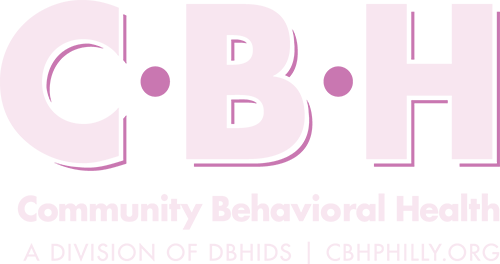Family Services

Family Services include an array of treatment services available to children, adolescents, and families that support their needs in the home, school, and community. These services ensure quality, family-driven, and youth-centered treatment is provided to CBH members.
To learn more, please contact CBH_CCBS.Team@phila.gov
Who Qualifies for These Services?
Community-based services are available to children and adolescents under the age of 21 who have a DSM-5 diagnosis and meet medical necessity criteria (MNC). Each service is expected to provide individualized treatment and/or care coordination in a familial/natural environment and is provided to the member across all settings (school, home, and community).
Levels of Care
Through different levels of care, members can receive comprehensive, evidence-based, and informed treatment that will sustain community tenure, advance emotional, physical, and cognitive development, and strengthen the family system within its natural environment.
Family-Based Mental Health Services (FBMHS)
Family-Based Mental Health Services (FBMHS) is an eight-month, comprehensive family therapy treatment designed for children and adolescents under 21. It is considered the most intensive in-home family service in the CBH children’s continuum of services.
FBMHS strive to promote in-home, community-based treatment so families can address challenging child/adolescent behaviors and patterns of interaction in the home, reducing reliance on out-of-home placements such as residential treatment or foster care. In addition to supporting parents/caregivers, extended families, and other significant persons during the treatment process, FBMHS treatment seeks to help youth maintain community tenure by building further natural supports.
FBMHS integrate mental health treatment, family support, and case management. Parents and caregivers are considered part of the treatment team. FBMHS are provided at least one session per week but should increase in frequency and intensity whenever clinically indicated. For crisis planning and support, FBMHS teams are available 24 hours daily, 7 days weekly. FBMHS also provide assessments, aftercare planning, multisystem service linkage, and referrals.
Functional Family Therapy
Functional Family Therapy (FFT) is Intensive Behavioral Health Services (IBHS), formerly Behavioral Health Rehabilitation Services (BHRS). This national blueprint is an evidence-based intervention for youth and their families.
FFT is delivered over 3-5 months and is appropriate for youth ages 11-18. It is designed to help youth who may have acting-out behavioral challenges and a broad range of externalizing behaviors that encompass school problems, drug use and abuse, violence, delinquency, and oppositional defiant behaviors.
FFT aims to improve family communication, problem-solving, and supportiveness while decreasing the negativity and hopelessness embedded in troubled families. FFT has been proven appropriate for youth with conduct and delinquency challenges. It is often utilized as a resource by Probation and Family Court. However, it is worth noting that FFT can be used with all at-risk youth and should be considered as a treatment option from other referral sources as well (i.e., AIP, APHP, PRTF, Outpatient).
Multisystemic Therapy (MST)
Multisystemic Therapy (MST) is an evidence-based intervention for children/adolescents at risk of severe system consequences (risk of out-of-home placement) due to serious externalizing, anti-social, and/or delinquent behaviors (e.g., criminal activity, substance use) and their families. Children/adolescents and families receive treatment within the systems they are embedded in, such as their homes, schools, and communities.
Multisystemic Therapy for Problem Sexual Behavior (MST-PSB) is an adaptation of MST that aims to eliminate sexually abusive behaviors by children/adolescents and to ensure victim and community safety through the delivery of effective evidence-based family treatment. Children/adolescents and families receive intensive individualized treatment that includes family therapy, cognitive-behavioral therapy, social skills building, and school, peer, and community interventions.
Multisystemic Therapy for Risky Sexual Behavior (MST-RSB) is an adaptation of MST-PSB that aims to support children/adolescents who engage in RSB where these sexual behavior problems can place the children/adolescents themselves at risk for vulnerability and sexual exploitation. In this instance, the children/adolescents may be or become vulnerable or “victimized.” Thus, MST-RSB provides the opportunity, through treatment, for the children/adolescents to “return to a healthier sexual path.”
MST, MST-PSB, and MST-RSB are appropriate for children/adolescents ages 11-17. They provide intensive, community-based intervention that is strengths-based and present-focused, engaging children/adolescents’ entire ecosystems in assessment, planning, and intervention.
This level of care often includes 2-3 (and sometimes more) therapy sessions per week that address the multiple systemic factors associated with children/adolescents who commit externalizing behaviors (i.e., arrests, defiance across settings, returning from out-of-home placement), sexually abusive offenses, or sexually exploitive behaviors. Family treatment is delivered over 3-5 months for MST and 5-7 months for MST-PSB and MST-RSB, focusing on maintaining the children/adolescents’ safety in the community and identifying and addressing drivers and other referring behaviors.
MST, MST-PSB, and MST-RSB rely heavily on family therapy as a mechanism of change for the children/adolescents and families and draw on models of parent training, structural and strategic family therapy, cognitive behavioral therapy, and social skills building. Treatment must include a parent or caregiver who is willing to participate in family therapy.
Provider Contact List
Visit our Provider Directory and search for the selected level of care as the “Facility Type” to access the full list of our FBMHS Providers. A print version of the Provider Directory is also available.






